Will Turkey enter Europe with an open face?
Ralitsa Kovacheva, October 15, 2010
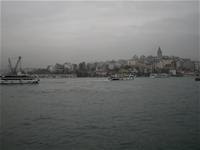 A wet and rainy morning in Istanbul. I notice that it is raining only after being on the street but it is too late to change the skirt and the high boots, so I go on. I realise my mistake when reaching the Galata Bridge, where the fine rain is mixed with wet spray carried by the strong wind. I am desperately trying to hold simultaneously the umbrella, the camera, and my skirt. However, I see the surprised faces of the fishermen on the bridge and the critical looks of the women with head-scarves.
A wet and rainy morning in Istanbul. I notice that it is raining only after being on the street but it is too late to change the skirt and the high boots, so I go on. I realise my mistake when reaching the Galata Bridge, where the fine rain is mixed with wet spray carried by the strong wind. I am desperately trying to hold simultaneously the umbrella, the camera, and my skirt. However, I see the surprised faces of the fishermen on the bridge and the critical looks of the women with head-scarves.
While walking across the bridge among the hordes of people having their 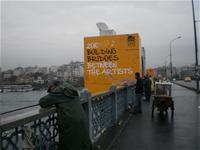 traditional bureks for breakfast, I remember the article in The Wall Street Journal, I read on the plane. The Turkish government has boldly revised its forecasts for economic growth expectations to 6.8% this year and 4.5% for 2011, because the economy is rapidly recovering from the crisis. Amid painful European recovery, this is literally a launch. Against this background, it seems odd why some European countries are not willing to accept Turkey into the Union.
traditional bureks for breakfast, I remember the article in The Wall Street Journal, I read on the plane. The Turkish government has boldly revised its forecasts for economic growth expectations to 6.8% this year and 4.5% for 2011, because the economy is rapidly recovering from the crisis. Amid painful European recovery, this is literally a launch. Against this background, it seems odd why some European countries are not willing to accept Turkey into the Union.
I'm thinking about this while walking to the former textile factory, nowadays a university property, where the forum "A Soul for Europe" is situated. This is a European initiative which aims to improve dialogue between politicians and civil society and to encourage participation of citizens and businesses in cultural life. Because culture can be a means of finding solutions to global problems that cannot be solved only by economical or political means, the organisers believe. On top of that, Istanbul is a European Capital of Culture for 2010.
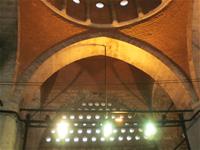 The former textile factory actually looks exactly like a Byzantine basilica. There is something symbolic in the atmosphere, having in mind the actual question whether Turkey belongs to Europe. However, once it was Constantinople, I think. Although now it is inhabited by other people. Muslims. Is this the problem of the opponents of Turkish membership in the European Union? I do not expect to get the answers from the participants, though the topics are mainly in the field of culture, but rather to feel it in the air somehow.
The former textile factory actually looks exactly like a Byzantine basilica. There is something symbolic in the atmosphere, having in mind the actual question whether Turkey belongs to Europe. However, once it was Constantinople, I think. Although now it is inhabited by other people. Muslims. Is this the problem of the opponents of Turkish membership in the European Union? I do not expect to get the answers from the participants, though the topics are mainly in the field of culture, but rather to feel it in the air somehow.
But I'm wrong, because even the first words of the participants grasped the bull 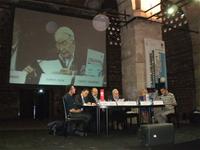 by the horns and put this issue straight on the table.
by the horns and put this issue straight on the table.
Hilmi Yavuz, a poet, a writer, a philosopher and an instructor from the Bilkent University explains long and demonstrates that Europe is not a geographical concept, but an idea and an identity. In this sense, we are not talking about a membership, but rather about a belonging. Can Turkey be part of a European civilizational project, Yavuz asks rhetorically, adding: We are not Europeans, we have come to Europe and in order to become an EU member, we must rewrite our history according to the European one. He thinks that the question is not whether Turkey can or cannot join the EU - Turkey simply should not be a member of the European Union. As regards the so-called privileged partnership, it is a second-class membership, which Turkey does not need, Yavuz says.
Professor Ferenc Miszlivetz, director of the Institute for Social and European Studies Foundation in Hungary, shares exactly the opposite view. According to him, it is a big mistake to believe that Turkey is not part of Europe. But Europe, being perceived not as the EU, but as a civilizational community. It is sufficient to read the history to prove this thesis, Miszlivetz thinks.
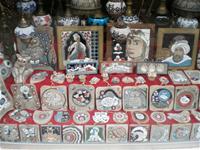 However, the reality seen from the inside is clearly another. Kutlug Ataman is a contemporary artist and a film maker, but with an acute political and social sense. According to him, in Istanbul Turkey successfully plays its "European role”, but when you come out of it and go to Anatolia, the picture changes. The artist shares the problems, which are well known to Bulgarian artists (and to the Bulgarians in general): archaic bureaucracy, uninterested politicians, lack of support in his own country while his ideas are highly appreciated abroad, mostly in Europe.
However, the reality seen from the inside is clearly another. Kutlug Ataman is a contemporary artist and a film maker, but with an acute political and social sense. According to him, in Istanbul Turkey successfully plays its "European role”, but when you come out of it and go to Anatolia, the picture changes. The artist shares the problems, which are well known to Bulgarian artists (and to the Bulgarians in general): archaic bureaucracy, uninterested politicians, lack of support in his own country while his ideas are highly appreciated abroad, mostly in Europe.
On behalf of the business, Dr. Bahadır Kaleagası, International Coordinator and Representative to the EU of Turkish Industry & Business Association (TUSIAD), sends the discussion back to a pragmatic framework. He thinks that the prospect for a European membership is serious, if not the only driver of reforms in Turkey. All decisions of the Turkish government comply with the EU, he says. The privileged partnership would be truly a second-class membership for us and would just stop the development of the democratic processes, Dr. Kaleagası says. The point is that the world is changing faster than Europe. Although the EU is the most successful example of integration hitherto, it is difficult to achieve common political will among the 27 member countries, he considers.
Jan Joost Langedijk is a Dutchman, a former MEP, who has lived in Istanbul since last year and is a senior adviser at the Istanbul Policy Center think-tank. He is also an author of books about the borders of Europe and its policy towards its Muslim neighbours. He says that the strategic benefits from Turkish membership in the EU are absolutely clear to both sides. On the one hand, Turkey is gaining high prestige for its economic partners in the Middle East, even from the accession negotiations process, because they view it as a gateway to the EU. That will change if this prospect fails, says Langedijk.
The EU is also aware of the economic, energy and geopolitical benefits of Turkish 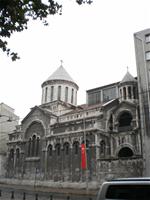 membership. But if these are compelling arguments for the institutions, European citizens are concerned by other things: religion, women's rights, freedom of speech. In this respect, Turkey must do much more, says Langedijk, but he is convinced that the main problem is not religion. "The EU is not a Christian club, it was not created on religious grounds, so there is no religious reason for Turkey to be held outside the EU”.
membership. But if these are compelling arguments for the institutions, European citizens are concerned by other things: religion, women's rights, freedom of speech. In this respect, Turkey must do much more, says Langedijk, but he is convinced that the main problem is not religion. "The EU is not a Christian club, it was not created on religious grounds, so there is no religious reason for Turkey to be held outside the EU”.
The debates never return to cultural topics, because a young girl from the audience takes the floor and passionately explains that the question, in fact, is another: why the EU creates barriers to free movement of Turks, why does it require visas, why can they not travel freely in order to know Europe better. The girl admits that she is among the few favoured, because she has for 3 years worked and lived in Rome. But I constantly hear people, who do not know that I am Turkish, to murmur against immigrants, including my countrymen, she tells.
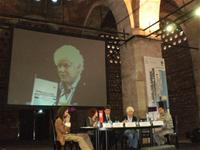 The issue of Turkish membership is even more painful, if put in the context of the problem with immigration. How serious enough it is to reorder the European agenda, moreover very soon, becomes clear by the words of Professor Paul Scheffer, a publicist and professor of urban sociology at the University of Amsterdam. In 2000 he published his essay "The Multicultural Drama”, which incited the debate on immigration and integration in the Netherlands. He is a member of the local Labour Party. "Believe me, in my town there are 40-50 thousands of your compatriots and I don’t have the impression that the Turks do not travel, by contrast, they seem to me quite mobile”, he tries to make a joke.
The issue of Turkish membership is even more painful, if put in the context of the problem with immigration. How serious enough it is to reorder the European agenda, moreover very soon, becomes clear by the words of Professor Paul Scheffer, a publicist and professor of urban sociology at the University of Amsterdam. In 2000 he published his essay "The Multicultural Drama”, which incited the debate on immigration and integration in the Netherlands. He is a member of the local Labour Party. "Believe me, in my town there are 40-50 thousands of your compatriots and I don’t have the impression that the Turks do not travel, by contrast, they seem to me quite mobile”, he tries to make a joke.
The joke doesn't sound funny at all. In the last elections in the Netherlands the xenophobic Freedom Party of Geert Wilders has become the third parliamentary force with 24 seats. The campaign of the party passed under the motto “Stop the Islamisation of the Netherlands!". And the ideas of Wilders stretched from banning the Koran to taxing head-scarves of Muslim women. "More security, less crime, less immigration, less Islam - that is what the Dutch chose", Wilders commented.
According to Scheffer, the collapse of boundaries for political and economic reasons creates cultural and social discomfort of the citizens. Because the immigrants simply do not socialise, do not accept the values, culture, rules of the society which they have come to live in. And the society does not hold them responsible for this. (What it means to be a citizen will actually be the subject of another analysis, because it goes beyond the problem of Muslim immigrants in Western Europe).
The moods described by Scheffer and demonstrated by the Dutch at the elections are shared by more and more Europeans. What really surprises me is that their motivation is not just economic - immigrants take our jobs or receive aid from the state, but mostly on religious and cultural basis. Watching from Sofia, it is difficult to imagine that Europeans in the 21 century are really scared by the invasion of the otherness, feel threatened by Islam, perhaps more than their ancestors felt when the Ottomans first came to Europe.
Again, I remember the words of Hilmi Yavuz, who passionately argued the 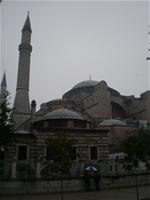 thesis that the EU is a product of European Christian history and Turkey has no place in it. "Europe has no borders, borders exist only for those who are different from the European mind". Obviously, most Europeans have no such European mind when they build boundaries in front of immigrants to the extent which literally means restoring border control. In his publications Paul Scheffer wrote that the hope to integrate immigrants in 1-2 generations now is completely forgotten. Muslims just do not integrate, they firmly refuse to accept the culture and values of their host communities.
thesis that the EU is a product of European Christian history and Turkey has no place in it. "Europe has no borders, borders exist only for those who are different from the European mind". Obviously, most Europeans have no such European mind when they build boundaries in front of immigrants to the extent which literally means restoring border control. In his publications Paul Scheffer wrote that the hope to integrate immigrants in 1-2 generations now is completely forgotten. Muslims just do not integrate, they firmly refuse to accept the culture and values of their host communities.
To the extent that they have become a threat and the response to it is already visible. And it is disturbing. Because it is a threat both to national states and to the European idea. There can be no European integration without an integration of the EU itself, Scheffer summarises. (Read the interview with Professor Scheffer on euinside in the coming days)
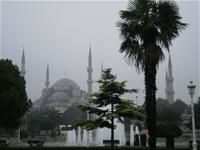 I feel divided, while leaving the conference. On the one hand, I disagree with the position that the fear from immigrants should bring us back to a closed society, moreover because of religious and cultural differences. On the other hand, I cannot stop thinking that maybe if I had lived in Amsterdam, where half of the population is first or second generation immigrants, I would think otherwise. Can we expect from Western Europeans, who currently have a problem with Muslim immigrants, to accept Turkey with open arms in the EU? And can we expect 70 million Turkey to integrate itself into the Union, since this is obviously not happening now with the Turkish (and not only) immigrants in Western European countries?
I feel divided, while leaving the conference. On the one hand, I disagree with the position that the fear from immigrants should bring us back to a closed society, moreover because of religious and cultural differences. On the other hand, I cannot stop thinking that maybe if I had lived in Amsterdam, where half of the population is first or second generation immigrants, I would think otherwise. Can we expect from Western Europeans, who currently have a problem with Muslim immigrants, to accept Turkey with open arms in the EU? And can we expect 70 million Turkey to integrate itself into the Union, since this is obviously not happening now with the Turkish (and not only) immigrants in Western European countries?
As I walk and ponder, it went dark. I quicken up my pace, because I notice that there are no longer women on the street, or at least not alone. I remember that before getting to the hotel I must get something for dinner. There is a smell of kebab and I follow the scent of roasted meat. When I stood before the window of the restaurant, however, I meet the gazes of two dozen men, drinking tea and smoking cigarettes in silence. Only men. I nervously twitch my skirt down, but I don't have the courage to get inside and go down the street. I never know if the problem is that I am a woman, or whether because I am wearing a skirt or just that obviously I'm not local. It is enough that I'm different.
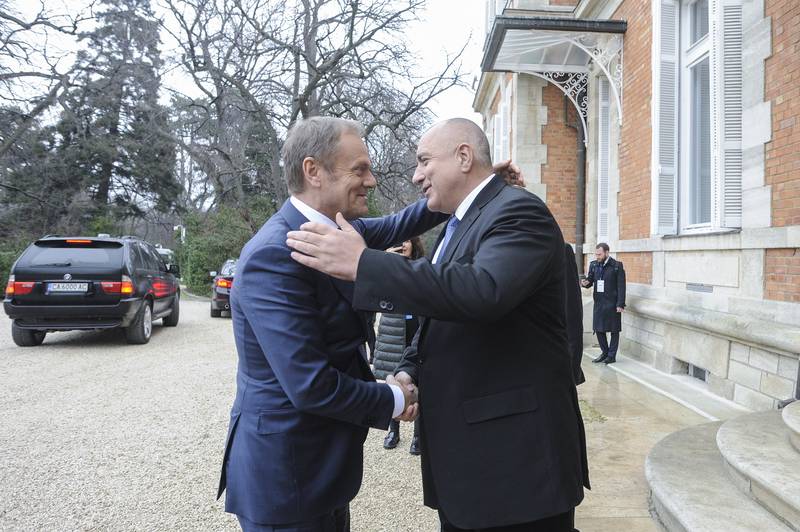 Donald Tusk, Boyko Borissov | © Council of the EU
Donald Tusk, Boyko Borissov | © Council of the EU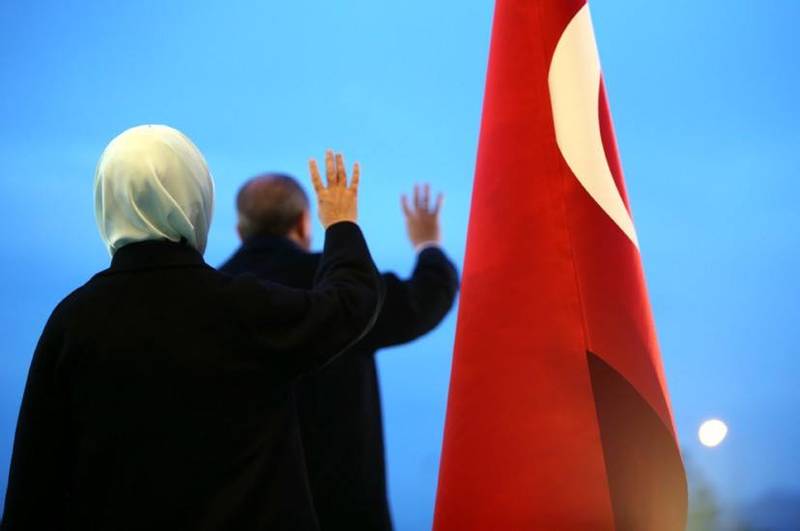 | © Turkey Presidency
| © Turkey Presidency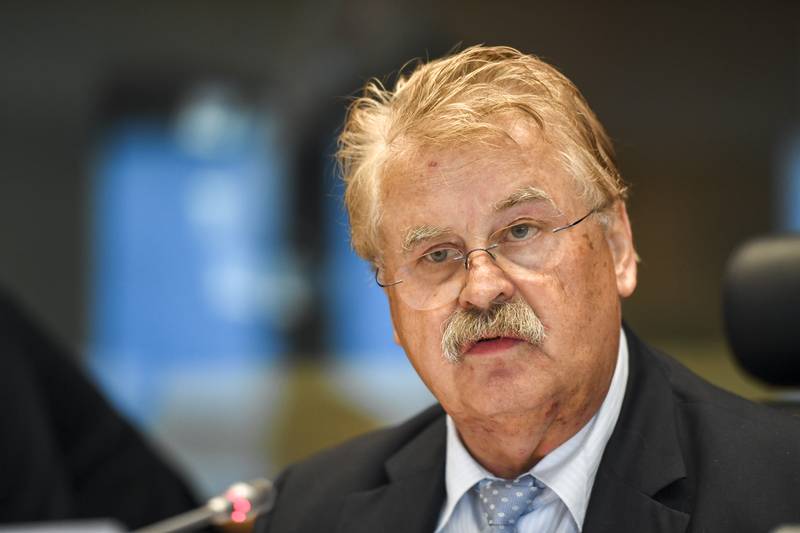 Elmar Brok | © European Parliament
Elmar Brok | © European Parliament